Congratulations to the PFF Scholar award recipients!
-
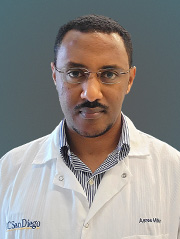
Asres Berhan, PhD
Postdoctoral Scholar in the Division of Pulmonary, Critical Care and Sleep Medicine
University of California, San DiegoThis proposal is funded by The Hastings Foundation
Dr. Asres Berhan is a postdoctoral scholar in the Division of Pulmonary, Critical Care and Sleep Medicine at the University of California, San Diego. Asres received a bachelor’s degree in Pharmacy from Jimma University and a master’s degree in Pharmacology from Addis Ababa University in Ethiopia. After receiving his master’s degree, he worked as an instructor of pharmacology at Hawassa University (Ethiopia) and engaged in multiple collaborative meta-analyses of randomized double-blind controlled clinical trials to evaluate the efficacy, safety and tolerability of selected antidiabetic, antirheumatic and antiretroviral drugs. He received his PhD from the University of Melbourne School of Biomedical Sciences in Australia in the laboratory of Dr. Alastair Stewart studying the role of matrix stiffness in human lung fibroblast phenotypic plasticity and extracellular matrix production. Currently, under the mentorship of Dr. Zea Borok, Dr. Berhan is investigating the phenotypic plasticity of idiopathic pulmonary fibrosis (IPF) vs normal human alveolar epithelial cells (AEC) using a three-dimensional (3D) organoid model together with single cell multiome analysis to elucidate mechanisms that regulate AEC plasticity in IPF. He hopes to identify novel signaling pathways and potential drug targets to treat IPF by bridging the fields of pulmonary fibrosis, lung bioengineering and regeneration.
-
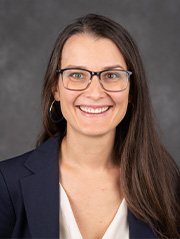
Ksenija Bernau, PhD
Associate Scientist in the Division of Allergy, Pulmonary and Critical Care Medicine
University of Wisconsin-MadisonThis proposal is funded by Boehringer Ingelheim Pharmaceuticals, Inc.
Dr. Bernau is an Associate Scientist in the Division of Allergy, Pulmonary and Critical Care Medicine at the University of Wisconsin-Madison. She received her PhD in Biomedical Engineering from the University of Wisconsin-Madison, with her dissertation focusing on development of novel methods for non-invasive cell tracking via magnetic resonance and bioluminescence imaging. She then completed her post-doctoral fellowship studying the molecular mechanisms of idiopathic pulmonary fibrosis under the mentorship of Dr. Nathan Sandbo at the University of Wisconsin-Madison. Dr. Bernau’s research combines her expertise in molecular biology of pulmonary fibrosis and molecular imaging with a long-term goal of developing novel probes for improved diagnosis and assessment of pulmonary fibrosis disease activity. Since there are currently no methods for non-invasive, real-time assessment of active extracellular matrix deposition, the hallmark of idiopathic pulmonary fibrosis, novel molecular imaging probes are urgently needed for more efficient therapeutic decision-making, with the potential to improve patients’ clinical outcomes. Dr. Bernau’s current proposal utilizes a novel, radiolabeled peptide as a positron emission tomography (PET)-based probe for non-invasive, contemporaneous assessment of pulmonary fibrosis disease activity. This proposal will serve as a stepping-stone for the probe’s translation into the clinical realm.
-
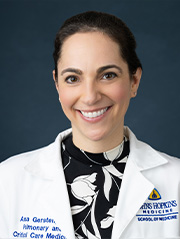
Anna Gersten, MD
Interstitial Lung Disease Team
Johns HopkinsThis proposal is funded by The Buckeye Foundation, the Chuck and Monica McQuaid Family Foundation, and Ms. Holly Harralson
Dr. (Rebecca) Anna Gersten is dual fellowship trained and board certified in pulmonology and palliative medicine. She is a proud member of the Johns Hopkins Interstitial Lung Disease Team and also practices palliative medicine. Dr. Gersten has dedicated her career to improving quality of life in patients with pulmonary fibrosis. She leads an interdisciplinary Breathlessness Clinic that she developed to meet the supportive care and symptom management needs of patients with pulmonary fibrosis. Her research focuses on understanding the palliative care needs in patients with pulmonary fibrosis and studying novel approaches to address these currently unmet needs. Dr. Gersten has spoken nationally and internationally about her research and the role of palliative care in pulmonary fibrosis. She is deeply honored to be selected for the Pulmonary Fibrosis Foundation Scholars Program and looks forward to improving care for those impacted by pulmonary fibrosis.
-
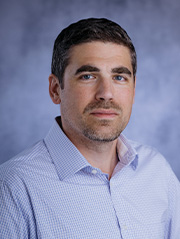
Stephen Gurczynski, PhD
Assistant Professor, Department of Microbiology and Immunology
University of MichiganThis proposal is funded by Boehringer Ingelheim Pharmaceuticals, Inc.
Dr. Stephen Gurczynski is an Assistant Professor in the Department of Microbiology and Immunology at the University of Michigan, Ann Arbor. Dr. Gurczynski received his Ph.D. at Wayne State University and completed a post-doctoral fellowship with Dr. Bethany Moore at the University of Michigan studying the pathophysiology and immunology of pulmonary fibrosis. Dr. Gurczynski has interests in the intersection of cellular metabolism and inflammation and is specifically interested in how various immune cells such as dendritic cells and macrophages integrate these signals during fibrogenesis. More recently, he has begun to study how coronavirus infection alters tryptophan metabolism and how those alterations can feed pro-inflammatory networks leading to exacerbations of interstitial lung disease. Dr. Gurczynski’s long term goals are to utilize the results of this research to develop treatments targeting specific enzymes responsible for these pro-inflammatory metabolic alterations.
-
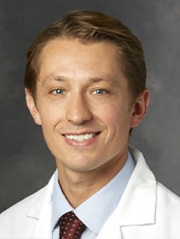
Matthew McCarra
Instructor, Division of Pulmonary, Allergy, and Critical Care Medicine
Stanford University School of MedicineThis proposal is funded by The Hastings Foundation
Dr. Mathew McCarra is an Instructor in the Division of Pulmonary, Allergy, and Critical Care Medicine at Stanford University School of Medicine. He completed his undergraduate studies in Genetics, Cell Biology, and Development at the University of Minnesota. Following his undergraduate studies, he spent a year living in Kenya studying the immunology of malaria before returning to the University of Minnesota where he received his MD. He pursued fellowship in Pulmonary and Critical Care at Stanford University, where he was selected as a chief fellow, and received additional training in lung epithelial biology supported by the T32. He maintains a practice in pulmonary medicine with a specific focus on treating patients with interstitial lung disease. His research interests include lung stem cell biology with a focus on defining the expression of telomerase at the cellular level given the clear association of telomerase mutations with fibrotic lung disease. His overarching goal is to use findings at the bench to develop novel therapeutics that will improve the quality and longevity of the lives of his patients with interstitial lung disease.
